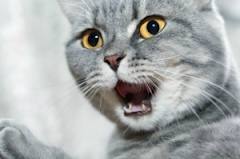{[[' ']]}
']]}
 ']]}
']]}Pet cats have their own way of communicating to their masters. Unlike dogs, they are more subtle in the way they express something. Head nudges, straight-forward stares, body brushes and even mere quick tail flicks can be their own form of communication.
As much as dogs bark excessively when they need to be attended to, in the same way, a cat’s “meow-ing” capability is the more obvious one when they have to demand a little more attention. It is very clear that they want something or perhaps they need food or just saying “hi”. According to Dr. Ilana Reisner, DVM, PhD, a board-certified veterinary behaviorist at Reisner Veterinary Behavior & Consulting Services in Media, Pa., if it's clear that the object of a cat's meow is a human, she likely wants something.
Obviously, there are cats that are distinctively quiet but most cats are downright “noisy” when they “meow” to the top of their lungs. Most often than not, excessive “meow-ing” of cats tend to be annoying. Original breeds of cats have the tendency to be chatty and noisy. This is really based on their genetic make-up, however many experiences and exposure to environment has led most cats to “meow” a bit more than others. What is the reason behind extreme “meow-ing” of cats?
The behavior of masters, tend to lead cats to become noisy. Whether we agree or not, there is a subliminal effect on cats with the way we treat them. For example, when they “meow” for the reason of asking food, we immediately give them something to eat. However, when they still want some more food, they “meow” again, and we give them some more. This goes on and on until the cat gets used to “meowing” as if demanding to be satisfied. This becomes a form of manipulation and control. Food reinforces the “meow-ing”, so the cat does it again and again.
Learning and training plays a pivotal role in bringing up the ways of the cat. Although they are genetically designed to “purr” and “meow”, excessive vocalization is usually reinforced by the nurturing process.
According to Dr. Reisner,"Vocal cats are usually vocal as juveniles and then through their lives, but learning plays an important role.”
There’s an important note to keep in mind with this new learning. For cat-lovers and owners, most excessive “meow-ing” is often brought about by an attention-seeking behavior, but if it persists, you may want to consider visiting a veterinarian for some indications of pain, sickness and other medical concerns.













Post a Comment